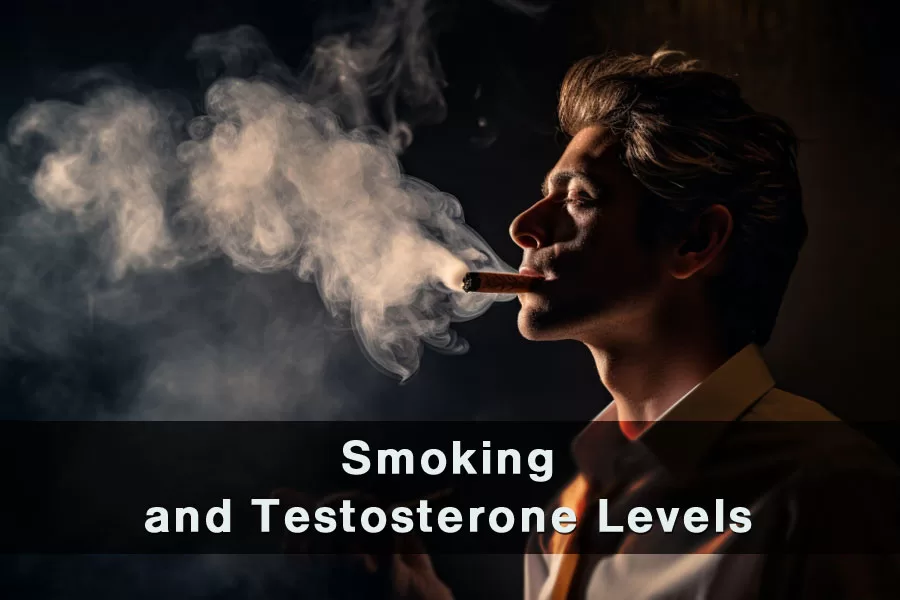
Hormones like testosterone, which are traditionally associated with masculinity, play a significant influence in the overall picture of health. Men and women alike depend on this hormone, which affects many different facets of health. Let us now introduce smoking into this picture, a habit that continues to hold many people back despite its diminishing popularity. What impact does smoking have on testosterone levels?
Decoding Testosterone
When you hear “testosterone,” you might instantly think of gym buffs and male traits. But let’s dive into what this hormone really does, way beyond these common ideas.
The Basics of Testosterone
- In Guys: Testosterone is made mostly in a guy’s testicles. It’s like the backstage crew that sets the scene for puberty, handling everything from voice changes to beard growth. But it doesn’t clock out after puberty. It helps guys stay strong, keeps their bones tough, and even plays a part in how they feel day-to-day.
- In Gals: Yes, women have testosterone too, but in smaller amounts. It’s made in the ovaries and some other parts of the body. For women, this hormone isn’t about physical strength alone. It helps with bone health, muscle maintenance, and overall pep.
Testosterone’s Life Cycle
- Growing Up: In boys, testosterone is kind of on standby during childhood. When puberty hits, it springs into action. For girls, it’s more of a background player, but still important.
- Adulting: As men get older, their testosterone levels naturally take a dip. This doesn’t just affect gym performance; it can change their energy levels and mood too. Women also see changes in testosterone, especially with life events like pregnancy or menopause.
What Influences Testosterone?
- Your Choices: The way you live plays a big role in your testosterone levels. Eating well, staying active, and getting enough sleep can all help.
- Health Stuff: Certain illnesses can mess with how much testosterone your body makes. This goes for both men and women.
- Where You Are: Believe it or not, your environment matters too. Being around certain chemicals can throw your hormone levels off balance.
Why Care About Testosterone?
It’s not just about being buff or feeling manly. Testosterone has a lot to do with how lively you feel, how strong your bones are, and even your mood. Understanding this hormone in a more down-to-earth way shows us it’s a big deal for everyone’s health, not just for guys or athletes.
Smoking’s Broad Spectrum of Harm
Smoking does a lot more damage to the body than just causing coughs or lung problems. It’s like an invisible enemy that quietly harms almost every part of your body without you even realizing it.
First off, it’s really tough on your heart and blood vessels. It makes them narrower and weaker, which can lead to serious heart problems or even strokes. It’s not just about getting short of breath; it’s about putting your heart in real danger.
Then there’s your skin. Smoking can make you look older than you are, giving you wrinkles and making your skin less healthy and vibrant. It’s like speeding up your skin’s clock.
Your teeth and gums don’t escape either. Smoking can stain your teeth and damage your gums, which can lead to teeth falling out. It’s more than just bad breath; it’s risking a healthy smile.
For men and women, smoking messes with your ability to have kids. It can make men’s sperm less healthy and can cause erection problems. For women, it can make it harder to get pregnant and can cause problems during pregnancy.
It also hits your body’s defense system, making it harder to fight off sickness. And it weakens your bones, making them more likely to break.
So, when you think about smoking, remember it’s not just about lung cancer or a bad cough. It’s a whole list of problems that can make you unwell in many different ways. Quitting smoking is one of the best things you can do to avoid all these risks and keep your body healthier.
Smoking and Testosterone
Testosterone with smoking: According to certain research, smoking reduces testosterone. Some claim that it might go up. Some believe there aren’t many changes. So it’s a little bit of a riddle.
Cigarettes Might Mess with Hormones. Cigarettes have things like nicotine in them. These things could mess with the body’s hormones, including testosterone.
Not Only Testosterone: Other hormones besides testosterone may also be impacted by smoking. This impacts both genders equally.
Lung Damage in Detail:
- Emphysema Explained: This is where the tiny air sacs in your lungs (alveoli) get destroyed. These sacs are super important because they let oxygen get into your blood. When they’re damaged, you can’t breathe properly.
- Chronic Bronchitis Breakdown: Here, the airways in your lungs stay inflamed and full of mucus. It means you’re constantly coughing and struggling to breathe.
How Lung Cancer Happens: The smoke from cigarettes has chemicals that can change the cells in your lungs. Over time, these changes can turn into cancer.
Heart and Circulatory System:
- Atherosclerosis Explained: Smoking makes fatty substances build up inside your blood vessels. This narrows them, making it hard for blood to get through.
- Increased Heart Attack Risk: With your blood vessels clogged, your heart can’t get the blood it needs, which can lead to a heart attack.
- Stroke Risks Clarified: When blood vessels in the brain get blocked or burst due to smoking, it can cause a stroke.
Cancer Beyond the Lungs:
- Mouth and Throat Cancer: The smoke affects not just your lungs but also your mouth and throat, leading to cancers in these areas.
- Bladder Cancer Connection: Chemicals in cigarettes can end up in your urine, damaging the bladder over time.
Reproductive Health in Focus:
- Impact on Fertility: For women, smoking can harm the eggs and for men, it can damage the sperm, making it harder to conceive.
- Pregnancy Complications: Smoking can reduce blood flow to the fetus, leading to issues like low birth weight or premature birth.
Digestive System:
- Ulcer Formation: Smoking can increase stomach acid, which can lead to painful ulcers in the stomach lining.
- Liver Disease and Cancer: Smoking can exacerbate liver diseases and increase the risk of liver cancer.
Skin, Hair, and Nail Effects:
- Premature Aging of Skin: Smoking reduces blood flow to the skin, leading to wrinkles and a dull complexion.
- Hair Thinning and Loss: Smoking can damage hair follicles, leading to hair loss.
- Nail Fungus and Discoloration: Fingers holding cigarettes can develop fungal infections and yellowing.
Bone Health Detailed:
- Bone Density Reduction: Smoking reduces the amount of calcium in bones, making them weaker and more prone to fractures
Oral Health Effects:
- Gum Disease and Tooth Decay: Smoking makes your gums weaker and more prone to infection, leading to tooth loss.
- Reduced Taste and Smell: The chemicals in smoke can damage your taste buds and sense of smell.
Mental Health and Addiction:
- Nicotine Dependence: The addiction to nicotine can cause irritability and anxiety, especially when you try to quit.
- Mood Disorders: Long-term smoking is linked with an increased risk of depression and anxiety disorders.
Lifespan and Quality of Life:
- How Smoking Shortens Life: Due to the various health issues it causes, smokers, on average, live shorter lives than non-smokers.
- Impact on Daily Life: Chronic conditions from smoking can make everyday activities more difficult and decrease overall life enjoyment.
Path to Recovery: Quitting and Testosterone’s Comeback
Quitting smoking is a tough road, full of cravings and mood swings, thanks to nicotine addiction. It’s like a rollercoaster for your body and mind. But, there’s light at the end of the tunnel. When you manage to kick the habit, your body starts patching itself up, hormone levels included.
Here’s the cool part – after ditching cigarettes, your testosterone starts to climb back up. It’s not a quick fix, though. How fast and how much it recovers depends on things like how long you’ve been smoking and how much you smoked.
As your testosterone levels get better, you might notice some pretty neat changes. You might feel more peppy, see some muscle gains, and find your mood and interest in romance getting a boost. It’s like your body’s way of thanking you for quitting smoking.
Of course, a healthy lifestyle – eating good stuff, staying active, and getting enough sleep – helps turbocharge this recovery. And sometimes, a chat with a doctor might be in order, just to make sure everything’s on track.
Keeping away from smoking is key to maintaining these gains in testosterone. Regular health checks are a smart move to keep tabs on your hormone levels.
In a nutshell, “Path to Recovery: Quitting and Testosterone’s Comeback” is about how dropping the smoking habit can kickstart a return to healthier testosterone levels. It’s not an easy journey, but it’s definitely worth it for feeling better and healthier overall.
Conclusion
Let’s really look at what happens when someone who smokes decides to quit, focusing on what it means for their testosterone. Smoking has a sneaky way of messing with this hormone, which is important for more than just muscle and sex drive. It plays a big part in how you feel every day, like your get-up-and-go energy and how steady your mood is. When you stop smoking, it’s not just about getting rid of a bad habit.
It’s about your body starting to fix itself. This fix isn’t super fast; it takes time for your testosterone to get back to where it should be. But as the days without cigarettes add up, your body slowly starts to get its hormone balance right again. You might start to feel more energetic, your mood might get better, and overall, you just start to feel healthier.
Not right away. When you quit smoking, your body doesn’t fix your testosterone level overnight. It’s a slow process. How long it takes can depend on how long you’ve been smoking and how healthy you are in general.
Smoking can cause a bunch of other health problems. It’s really bad for your lungs and heart, can give you different kinds of cancer, and can even make your skin look older and your teeth worse.
No, it’s different for everyone. How much your testosterone level changes because of smoking depends on things like how much you smoke every day and for how long, as well as your own body’s way of dealing with it.
Living healthy helps a lot. This means eating well, getting regular exercise, sleeping enough, and handling stress well. Sometimes, you might also want to talk to a doctor, especially if you’re worried about your hormone levels.







